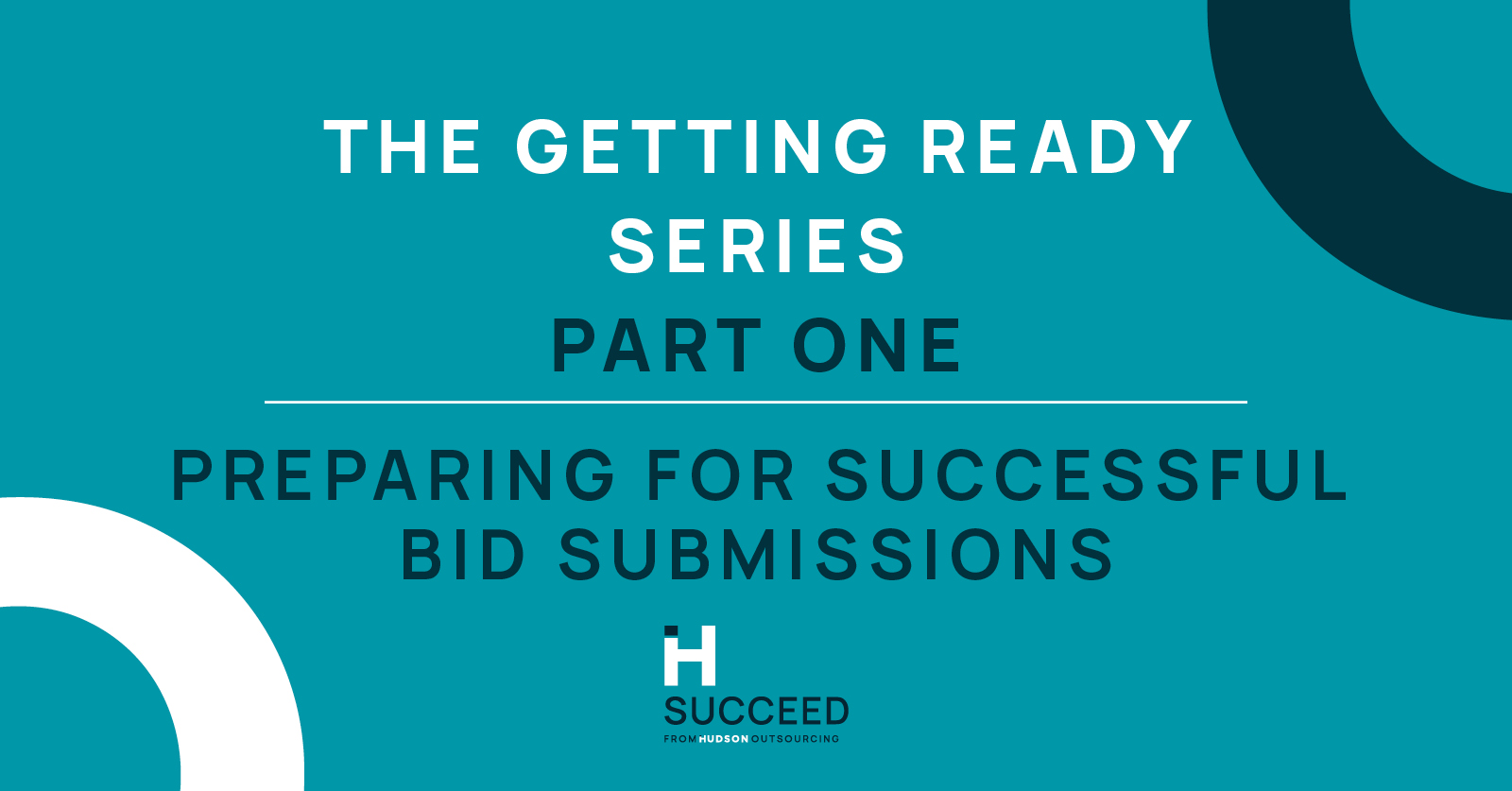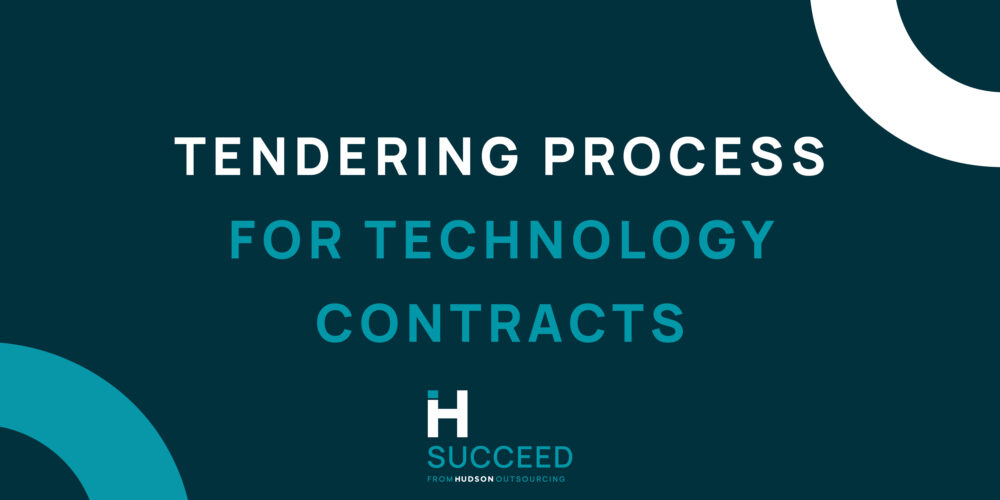The submission of bids – prepare to succeed
[Last modified: July 2021]
The submission of bids is, arguably, one of the most daunting elements of tendering for contracts. You have spent so much time and likely used many resources to get this far. Due to the digital world we live in, most submissions take place online. Buyers will often refer you to a portal where you can download information and upload your response.
This blog is the first in our Getting Ready Series, which will run throughout December. The series will focus on preparing yourself for the tendering process and submitting a bid. Whether you are a seasoned professional or new to tendering, prepare to pick up some top tips and expert insight.
-
Tendering for work in December
Firstly, we need to dispel the myth that you should wait until January to bid for contracts. We don’t know where this ideology came from, but we need to throw it out.
Our experts at Hudson Succeed always recommend tendering for contracts whilst you’re delivering current work. This is the case at any time of year. It means that once your current contract comes to an end, you have a ready-made pipeline to move onto.
We see so many businesses making the mistake of letting their development take a break in December. Your development strategies shouldn’t get annual leave! They should be a continuous process throughout the year.
December is the time to start building your pipeline. Secure your income for next year and get ahead of your competition.
-
Are you really ready to submit your bid?
When it comes to submitting your bids, we always advise completing a thorough proofing process beforehand. Ask yourself: am I 100% happy and confident in this tender response?
When working so closely with a project, it’s easy to miss mistakes. Even proofreading your own work isn’t thorough enough! You’ll likely read it as you think you’ve written it and gloss over any mistakes. An impartial pair of eyes is always the best way of ensuring error-free work.
We’re not only referring to spelling and grammatical errors. When asking someone to proofread your work, they should do so in line with the specification. They should analyse your work as if they were the buyer. This is the best way to guarantee that you are directly addressing the specification and answering questions.
Don’t get us wrong, it’s great to talk about how amazing your organisation is. With the passion you have for your business, it’s tempting to fill the tender response with accolades of your organisation. However, this isn’t the best way to win a tender. Buyers want to see in-depth responses that answer the question. Ensure you’re doing this by breaking down the questions before putting pen to paper (or fingers on keys).
When your impartial proofreader analyses your work, they should be ruthless. Ask them to not hold back and highlight any areas that could be removed. However, when removing content, it’s important to replace it with key information. Don’t submit 100 words if the question asks for 800, for example. Keep your bid writing concise and the information rich.
-
Different types of submission
If you have tendered for work before, you’ll know that each bid is slightly different. When reading through the tender documents to make your bid or no-bid decision, the submission section is equally as important. Make sure that you understand how the buyer has requested the final submission to be made. And of course, check and double check the deadline!
Submitting bids electronically
When the submission of bids takes place electronically, there are a few things to consider.
- Firstly, consider the portal. Just because you submitted bids in the past doesn’t mean that you will immediately be able to navigate any portal. A new buyer might use a different system. This means that you have to be prepared. Even if you consider yourself to be “tech-savvy”, it’s vital that you familiarise yourself with the system in advance. Don’t leave it until the day of the submission to start looking at how to actually upload and send your responses.
- Secondly, you should check how to attach your documents and the editing functions. See if you can edit the documents once they have been uploaded. Some portals will allow you to upload your responses, then go back in before the deadline and make changes. This is helpful if your team is working remotely on different sections. However, not all portals will allow this, so it’s best to get to grips with the system in advance.
Postal submissions
Believe it or not, some buyers will still request a postal submission. Sometimes, the buyer will even ask for both an online and a postal submission.
When submitting your bids through the post, consider the following;
- Check with your local post office to ensure you leave enough time for your submission to arrive, in advance of the deadline. There’s nothing more stressful when submitting a bid than knowing that your tender will arrive within a hairsbreadth of the deadline time.
- We recommend bringing all your internal timescales forward when working towards a postal submission. Disregard the final deadline and set a much earlier deadline for yourself and your team. This will help to alleviate any stress further down the line.
- Take printing into account when planning your bid. Do you need to attach appendices or other documentation? Make sure you factor this into your bid plan before commencing the work.
Submissions over email
Some buyers might request that the submission of your bid takes place over email. Here you should consider;
- The size of your files. You may need to compress your files or send the work in multiple emails. If this is the case, you should check with the buyer via a clarification question first.
- The reliability of emails. Even though email is a seemingly reliable source of communication, don’t be too assuming. How often have you heard “I haven’t received it” or “Is it in your junk?” around the office? Sometimes even emails can let us down. For this reason, it’s important to pre-empt any potential technical problems and send your work in advance.
- Remaining professional. This might sound simple, but you’d be amazed by how colloquial some people are over email. Remember, you’re still trying to sell your services/goods to the buyer. You still want them to pick you. Remain professional, you’re still representing your business.
-
How to prepare for a submission
Congratulations! You’ve finished your bid writing. But unfortunately, you’re not quite done yet.
Here is a quick checklist to complete before the submission of your bids.
- Have you completed all the elements that the buyer asked for in the specification? This can be a simply ticking exercise. Go through the specification and tick everything you have created to ensure it is ready to go.
- Have you thoroughly proofread your written responses? Are you sure there aren’t any spelling or grammatical errors?
- Have you directly answered all the buyer’s questions, addressing the specification in detail?
- Have you easily labelled and attached all appendices and supporting documents?
Depending on the individual tender, there may be more to assess before you submit. Luckily, there is support available to you.
-
Need a second pair of eyes before the submission of your bid?
The submission of your bids should bring about a sigh of relief. The bid has gone, and the outcome is now out of your control. However, if you need some support, look no further than Tender Mentor.
We designed our Tender Mentor service to act as a second pair of eyes before pressing the submit button. Re-reading and assessing is a time-consuming process, and you have already spent enough time creating the bid.
Simply upload your work and the accompanying tender documents. Our team of expert Bid Writers will assess your responses in line with the specification. They will check for any spelling or grammatical errors as well as ensuring your answers meet the buyer’s requirements. Once they are satisfied that the bid will impress the buyer, you can press submit with confidence.
Why trust our Bid Writers?
Our team at Hudson Succeed have been helping businesses to grow through tendering for almost two decades. They proudly hold an 87% bid success rate and work across a multitude of industries. From Construction, to care, to website development, our Bid Writers are experts in winning. They know what makes a compelling, successful bid, and they are trusted by over 700 businesses, globally.
Further support
Need help writing a bid, support to increase your success rate or with the submission of bids? Get in touch for a free consultation. Our experts will assess the needs of your business and help you prepare to win more work, ready to reach your goals in the new year.
There’s no time like the present. Don’t be the person who says, “I’ll start in January”. Your competitors are starting now.
Stay tuned for the next blog in our Getting Ready Series, focussing on writing tenders and proposals, destined for success.
Find more helpful tips and advice in our blogs. We cover topics including:







